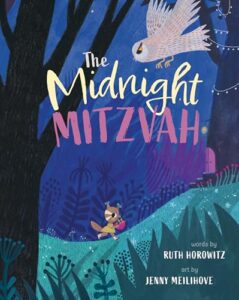Being a creature of perpetual lateness, let me apologize for that first before wishing a belated Shana Tova to all readers who celebrate!
 Whether Jewish or otherwise, plenty of people will enjoy and hopefully benefit from the message of The Midnight Mitzvah. Hanina Chipmunk is a champion nut collector who enjoys sharing her bounty with her friends and neighbors. Not only does she like feeding people, she also, admittedly, basks in the praise they give her in exchange. But Mathilda Squirrel gives her nothing but a cold reception when Hanina goes to visit one day, and spurns both gift and bearer. Hanina’s friends explain to her later that while it’s a mitzvah — the Hebrew word for blessing — to help others, it’s also a mitzvah to spare them embarrassment. Mathilda was once great at collecting nuts herself but refuses to admit that she’s no longer self-sufficient.
Whether Jewish or otherwise, plenty of people will enjoy and hopefully benefit from the message of The Midnight Mitzvah. Hanina Chipmunk is a champion nut collector who enjoys sharing her bounty with her friends and neighbors. Not only does she like feeding people, she also, admittedly, basks in the praise they give her in exchange. But Mathilda Squirrel gives her nothing but a cold reception when Hanina goes to visit one day, and spurns both gift and bearer. Hanina’s friends explain to her later that while it’s a mitzvah — the Hebrew word for blessing — to help others, it’s also a mitzvah to spare them embarrassment. Mathilda was once great at collecting nuts herself but refuses to admit that she’s no longer self-sufficient.
Hanina wants to help Mathilda, but how to do so without the squirrel losing face?* She finally resolves to bring Mathilda nuts under cover of darkness, so that Mathilda will not have to face the humiliation of accepting charity. But the night is dark and full of terrors… or as many as can be expected in a warm-hearted children’s book. Will Hanina be able to accomplish her mission and fulfill the mitzvah she’s undertaken?
Ruth Horowitz takes the Talmudic tale of Rabbi Hanina bar Pappa and translates it into cute anthropomorphic animal terms to make it easier for kids (and likely some of their caretakers) to understand. The message might come as a surprise to people accustomed to the kind of thinking that says it’s okay for fast food employees to loudly pray over a homeless man before condescending to give him food. Yes, charity is wonderful and espoused by virtually all the religions I know of. But a lot of religious folks forget that humility is just as important. I’ll be the first to denounce the idea of modesty as it’s commonly trumpeted today — let your light shine from out of that bushel, friends! — but giving yourself big ups at how charitable you’re being is gross. It’s nice to be praised, but as Hanina Chipmunk learns, it’s best to do good.
Ms Horowitz treads the philosophical lines considered here with aplomb, showing that yes, you can help people who don’t want to be helped, as long as you’re doing it with humility and out of genuine concern: out of goodness, if you will. There are absolutely times for confrontation and times for demanding acknowledgment, but making sure that people have adequate food to live on is not one of those times. Good deeds should be done without a desire for reward or even recognition. I loved how Ms Horowitz wrote about that, both in the body of the book and in the thoughtful and illuminating afterword.
Jenny Meilihove’s charming art captures both the sweetness and the suspense of living in the woods. In all honesty, I was deeply grateful for her brief discussion of her artistic process in this book. I spend a lot of time trying to figure out how illustrators do their work, and love how open she is about her use of gouache, pencils and crayons for her art here.
The Midnight Mitzvah is a terrific book about humility and remembering that giving is the most important part of charity. Recommended for anyone who wants to encourage empathy and civility in their kids.
*Unsurprisingly, this really resonated with the Asian in me.
The Midnight Mitzvah by Ruth Horowitz & Jenny Meilihove was published October 1 2024 by Barefoot Books and is available from all good booksellers, including
